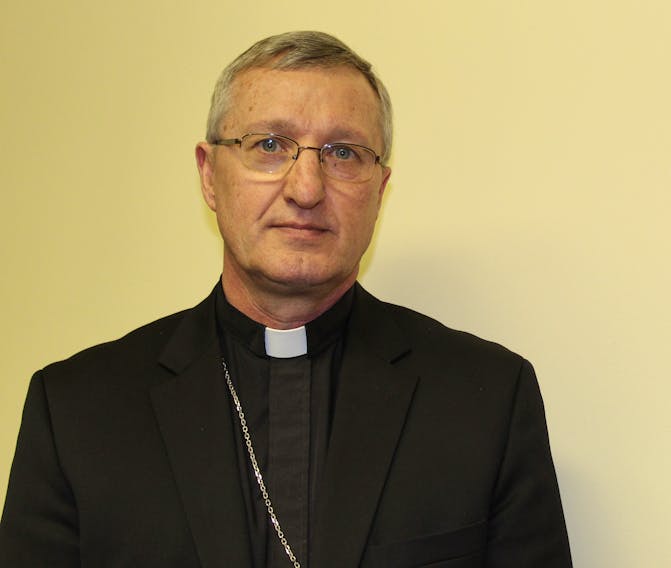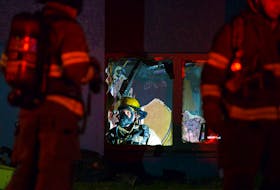ST. JOHN'S, N.L. — St. John’s Roman Catholic Archbishop Peter Hundt told churchgoers on the weekend the recent loss of the Mount Cashel civil lawsuit will have significant implications for parishes and parishioners.
“Therefore, we are presently working with financial and other advisers to discern how best to move forward to addressing (those implications),” Hundt said in a letter to the parishioners read at weekend services.
“There will be changes and sacrifices required of all of us as we move through this process. I cannot promise the road ahead will be an easy one, but certainly, the practice and celebration of our Catholic faith will continue.”
The Supreme Court of Canada recently refused to hear the church’s appeal of a decision by the Newfoundland and Labrador Surpeme Court of Appeal, which sided with victims from the 1940s, ‘50s and ‘60s of sexual abuse at the infamous Mount Cashel Boys orphanage, run by the Christian Brothers. The Roman Catholic archdiocese has been held vicariously liable even though it had claimed that the lay order was independent and therefore the church could not be blamed for what certain Brothers did.

“We must now move to address these claims to the best of our ability, and injustice to the victims,” Hundt said in the letter.
Regardless of the financial impact, Hundt said he hoped the resolution process will bring healing for the victims, their loved ones, and the entire community of faith, and bring closure to a dark chapter in the history of the archdiocese.
"As we move forward with this process, I ask that you please join with me in praying for God’s guidance, healing for the victims, and understanding, compassion and patience for us all,” Hundt said.
In an accompanying statement, he said he would not be making any more public comments at this time.
A victim responds
“The road ahead is very difficult for all of us also — we certainly had sacrifices and changes to our lives,” a Mount Cashel victim involved in the case said Sunday.
He is one of four John Does who were the representative plaintiffs, but the man is also one of five brothers — one now deceased — who were abused at the orphanage.
“A heartfelt, really purposeful announcement or apology that would really mean something — truly a response that would show what they really say has meaning (is required)." — One of the John Doe plaintiffs
“Our road ahead was not exactly easy, for it was strewn with broken lives, broken marriages and poverty and no celebration of faith, for it was lost amid our silent suffering with no religious salve to soothe,” he said of the fallout for the many Mount Cashel boys from his era who were abused.
“And now, the church is talking about church injustice to the victims. Is the church now looking (to be absolved) for years and years of neglect and further pain and suffering of the victims?”
The man said he has yet to hear a meaningful apology from the church.
“A heartfelt, really purposeful announcement or apology that would really mean something — truly a response that would show what they really say has meaning and they understand deeply what exactly the impact on the children were,” he said of what is needed from the church.

Case must proceed quickly, says lawyer
The January ruling by the Supreme Court of Canada ended a battle — for former residents who are now elderly men — of more than 20 years led by St. John’s lawyer Geoff Budden. (Ottawa lawyer Eugene Meehan argued the case for the victims at the Newfoundland and Labrador Supreme Court of Appeal.)
Budden said Sunday there is nothing surprising in Hundt’s statement.
“It’s good that the church recognizes the scale of the issue and they need to compensate the survivors of the abuse — not just the four plaintiffs in our case — but the large group of survivors from the ‘40s, ‘50s and ‘60s,” he said.
But Budden emphasized the process has to move along without delay, given the age of the victims, mostly in their 80s.
“None of them are young men,” Budden said. “It cannot go on indefinitely. We need to resolve this.”
Other cases related to church and religious orders around North America have seen the claims settled through insurance coverage, as well as liquidating assets and property.
In addition to the 60 clients of Budden’s firm represented by the four John Does, the decision also affects the unresolved cases of about 20 other claimants represented by various other lawyers.
“None of them are young men. It cannot go on indefinitely. We need to resolve this.” — Geoff Budden
In 2018, in the Newfoundland and Labrador Supreme Court, trial judge Alphonsus Faour, ruled the Archdiocese could not be found vicariously liable for the conduct of the Christian Brothers. The Court of Appeal concluded the trial judge made errors of law on that point, and that both the relationship between the Archdiocese and the Brothers was sufficiently close to justify finding the Archdiocese vicariously liable, and that it would have to pay damages to the victims.
The Newfoundland and Supreme Court civil trial — covered almost exclusively by The Telegram — heard among other things, claims of boys at Mount Cashel being beaten as they lined up for meals, having to eat porridge filled with dead grubs, and stealing scraps from vats of swill consisting of patients’ leftovers from city hospitals. There was also the recounting of an incident of a boy being dragged by a rope into a frigid swimming pool where the children were forced to bathe with bars of Sunlight soap to save on hot water, of a boy screaming as he was beaten in the shower because he’d been late and was ducking in and out of the cold water, of sexual acts committed at night by a Brother roaming through the young boys’ dorm, of a traumatized boy eating a chocolate bar and drinking pop while being sexually assaulted by the canteen operator because he had no idea what else to do.
The Mount Cashel sexual abuse scandal is most widely associated with the abuse of boys of a different era — the 1970s and 1980s — the revelation of which prompted the 1989-90 Hughes Inquiry. That era was not part of this civil case, and the boys from earlier decades were not part of compensation from the provincial government when it settled a block of cases from the '70s and '80s more than 20 years ago.
The Christian Brothers were removed from the original lawsuit, filed in 1999 because they went bankrupt.
Liquidation a complex exercise
If the church were to liquidate assets, it’s a complex exercise as there are various entities within the church including different religious orders, that owned or partially own properties that are not only churches, but schools and other holdings.
Based on information from a financial witness at the Supreme Court trial, Budden and Associates at the trial pegged the combined impact on the lives of the four John Does at about $8 million.
The ultimate judgment for the four men, however, was totalled at about $2 million. By that accounting, the liability for 60 victims might be about $30 million.









